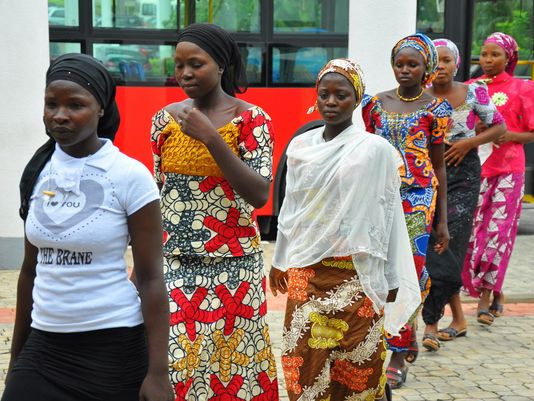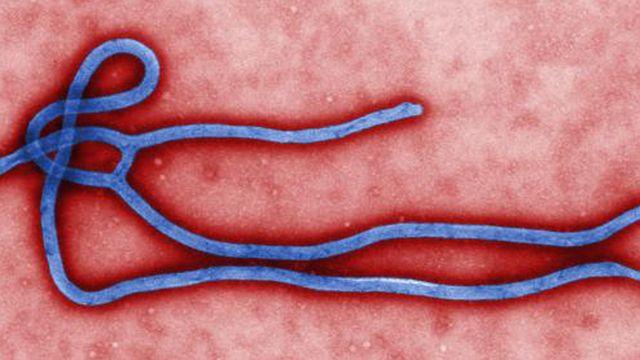Some of the Chibok girls that escaped from Boko Haram captivity
Chad forces have freed most of the persons kidnapped last week by Boko Haram Islamist group a Nigerian security official and a local self-defence member said Friday.
The group had abducted close to 100 persons on August 10 in Doron Baga in the Kukawa area near the border with Chad, said the official, who spoke on condition of anonymity because he was not authorized to speak to the media.
He said the terrorists were stopped as they crossed the Chad border by Chadian soldiers who killed most of them and set free most of the captives.
Muhammed Gava, a member of the anti-Boko Haram vigilante movement, said 20 females and about 70 young men had been forced to board speed boats in Lake Chad, which lies on the border between Nigeria, Chad, Niger and Cameroon.
Nigeria’s fight against the extremist group began in 2009 but hit the international spotlight in mid-April, when the militants kidnapped more than 200 schoolgirls. The girls have still not been freed.
Boko Haram wants to enforce an Islamic state in Nigeria, whose population of more than 170 million people is almost evenly divided between a mainly Muslim north and largely Christian south
In what appears to be a change in tactics, the Islamist terror group Boko Haram had kidnapped at least 97 men and boys and killed 28 people when they raided the farming and fishing village of Doron Baga and surrounding villages on the shores of Lake Chad, about 110 miles north of the state capital, Maiduguri.
They were loaded onto trucks and driving them away to unknown destination.
.
The latest incident is happening four clear months after the Suspected Islamist Boko Haram fighters abducted more than 200 girls from Government Secondary School, Chibok and drove away to Sambisa forests.
The group had earlier threatened to kidnap boys who they would force to marry the earlier abducted girls. The girls, except for the few that mangd to escape, are still missing. .
Report cite several witnesses who fled after Sunday’s raid on Doron Baga, a sandy fishing village near the shores of Lake Chad, as saying that the militants came clothed in military and police uniforms.
This dissembling has become a sustained strategy they use to confuse the people as to their actually identify before they unleash their heinous acts.
.
A Voice of America report quotes one Halima Adamu as saying that “They left no men or boys in the place; only young children, girls and women.”
Adamu, sobbing softly and looking exhausted after a road trip of 180 kilometers, or 110 miles, on the back of a truck to Maiduguri, capital of the northeastern state of Borno, added, “They were shouting ‘Allah Akbar’ [God is greatest], shooting sporadically.”
“There was confusion everywhere. They started parking our men and boys into their vehicles, threatening to shoot whoever disobey them. Everybody was scared.”
The witnesses said six older men also were killed in Sunday’s raid, while another five people were wounded.
Boko Haram, seen as the No. 1 security threat to Africa’s top economy and oil producer, is fighting to reinstate a medieval Islamic caliphate in religiously mixed Nigeria. Once a grassroots movement, it has rapidly lost popular support as its attacks on civilians dramatically increased in the past year.
Its tactic – forcing boys to fight and abducting girls as sex slaves – serves as a chilling echo of Ugandan rebel Joseph Kony’s Lord’s Resistance Army. This “army” has operated in the same way in Uganda, South Sudan and central Africa for decades.
The Nigerian military did not respond to a request for comment. A security source said officials were aware of the incident but were still investigating.
“I am appalled to see reports of another large abduction by terrorists in the northeast of Nigeria,” British Minister for Africa James Duddridge said in an emailed statement.
“Officials at the British High Commission in Abuja are urgently looking into the details,” the statement continued. “The UK stands firmly with Nigeria as it faces the scourge of Boko Haram.”
Britain and the United States have offered help to try to find the missing Chibok girls, but there has been no success yet.
The kidnappers overpowered local vigilantes, villagers said, noting there is no military presence.
Talatu Abubakar, another villager who fled to Maiduguri, said the invaders had taunted the men for being unable to defend themselves: “They were shouting, ‘Where is your pride? You people used to be warriors. Today you are all just women, not as brave as we thought.’ ”
Abubakar said 47 people were missing from his Hadeija clan and were feared to have been abducted.
The raid shows how mobile Boko Haram units can be.
After a military offensive in May last year broke their hold on the area around Lake Chad in Borno state’s far northeast, the rebels relocated to the state’s south, near the Cameroon border nearly 300 kilometers, or 190 miles, away. Chibok, the village from which the girls were taken, is in this area.
The rebels’ reappearance in the area demonstrates their ability to move across vast swaths of northeastern Nigeria without military interception.
Nigerian forces are overstretched against a determined foe. Security sources say that in the past week, they have fought gun battles with Boko Haram Islamists in two key southern Borno towns: Gwoza and the garrison town of Damboa, which the militants sacked a month ago.
The raid and kidnappings occurred on Monday, but the news did not emerge sooner due to lack of communication and because cell phone towers were destroyed in previous Boko Haram attacks.
Boko Haram has been active as a violent group since 2009 and has killed Nigerians, both Christian and Muslim, at rates frequently exceeding 100 people weekly.
The terror group abducted an estimated 276 girls in April from a boarding school in Chibok in northeastern Nigeria. Dozens escaped, but more than 200 are still missing.
The name “Boko Haram” translates to “Western education is sin” in the local Hausa language. The militant group is trying to impose strict Sharia law across Nigeria, the most populous country in Africa.
In late July, suspected Boko Haram gunmen abducted the wife of Cameroon’s deputy prime minister in a dawn attack on his home village of Kolofata, north of the area where they also kidnapped a local chief and his family, residents and security sources said.
THE RAINBOW, with agency reports














